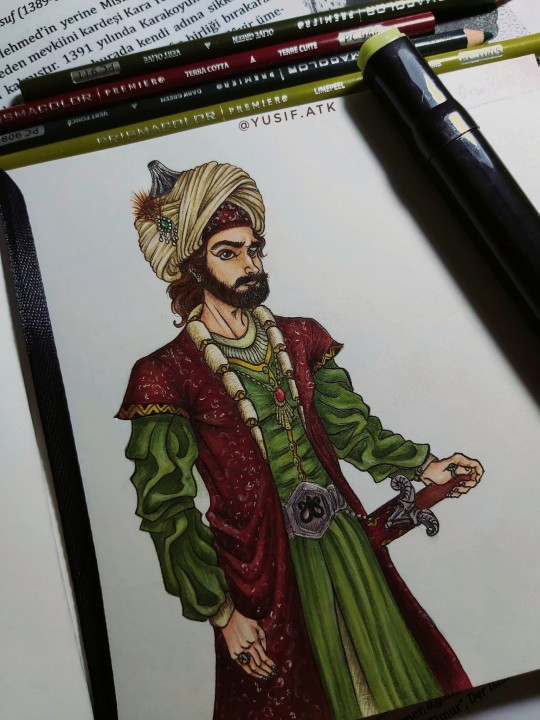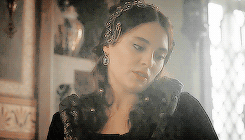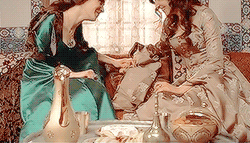Note
Hi, can you please name the evidences for Nurbanu was noble woman in Venice given by Pinar Kayaalp? You said she gives good proofs for this theory.
Kayaalp-Aktan relates the famous story of the servant who was sent to Venice by Selim to inquire about Nurbanu's origins in March 1558. In the letter written for Selim, the Senate said:
Because this chiaus announced that Your Highness, as the Master of your House, would like to know the parentage of the Signora Soltana borne in the island of Paris (sic) in the Archipelago, we submit to Your Majesty the information we were able to gather to the effect that the Signora Soltana, named Cecilia at her baptism, was borne in the land of Paris to a noble father of that city of ours, by the name of Nicolo Venier and a gentlewoman from Cà [House] Baffo, Violante. This Cecilia was taken to Constantinople when Captain Barbarossa stormed the aforementioned island of Paris. In the same city of ours resides our gentleman Zuan Francesco Venier, closest relative of the Signora Soltana, who is the son of a brother of the aforementioned Nicolo, her father.
The Çavuş re-appeared in Venice in mid-October 1559 reportedly bringing a letter written by Nurbanu: she wished to meet that Zuan Francesco Venier who the Senate had said was her cousin and closest relative. During that stay in Venice, though, the Çavuş was discovered to be an impostor: "The accusation of a member in Hasan’s delegate, a certain Deli Çoban, was most damning. As doubts about Hasan multiplied, the Seigniory faced the difficult decision as to whether to expose the Çavuş as an impostor and not honor Nurbanu’s request or to accord Hasan minimal hospitality and entrust him with a token message."
... a lukewarm letter was composed for Nurbanu and given to Hasan. In the letter it was explained that the Sultana’s wish would be immediately related to Zuan Francesco, who certainly would be happy to oblige his illustrious cousin’s wish but that it seemed unlikely for Nurbanu’s wish to come to fruition, considering that Francesco would not be able to leave his crucial post at Corfu.
Kayaalp-Aktan, as I have previously said, believes that the information that the Venetian Senate gave was true. Both Spagni and Rossi looked for records that attested a wedding between a Venier and a Baffo but found nothing; indeed, Rossi found that Niccolò Venier was married to a woman from the Zantano family and that had a son by her named Andrea. This, according to the two Italian historians, meant that Nurbanu was an illegitimate daughter.
The first piece of evidence that Kayaalp-Aktan brings in support of her theory is from the Cronaca Lippomano, a chronicle of the events from 1556 to 1568 written by a former Senator of the Republic of Venice. In it, Nurbanu is mentioned as "a Venetian Gentlewoman of the House Veniero, who, during the war of [15]37, was taken as a child from the island of Paris in the Archipelago, where her parents were Signori.”
Secondly, Marino Cavalli, former ambassador to the Sublime Porte and special envoy on the occasion of Selim II's enthronement, writing about the new sultan's favourite consort says:
For what is being circulated, she is a Corfiote subject of Your Seigniory, a Noble Venetian, as some would like to emphasize.
Kayaalp-Aktan says this is the first time Nurbanu is mentioned as a Corfiote.
The last piece of evidence comes from the relazioni of Badoaro and Garzoni, both dated 1575. Badoaro talking about Murad, writes:
"... born of a woman who is said to be a Corfiote of the House of Baffo, and with whom the Gran-Signore had the first male child: she is called the cassachi (haseki) and is very much loved by his majesty.”
Meanwhile Garzoni says:
“This Gran-Signore keeps in his palace his Royal Wife, from the House of Baffo, who had been [brought as] a slave from Corfu, and from whom the Sultan has a son called Amurat, currently twenty-eight years old.”
That Nurbanu is mentioned as Corfiote means that she lived with her mother in Corfu and not with her father in Paros.
"Badoaro’s and Garzoni’s reference to the House of “Baffo,” that is, Nurbanu’s maternal provenance, rather than the House of “Venier,” her paternal provenience, seems to have stemmed from the two authors’ knowledge that no formal marriage existed between Nurbanu’s mother and father."
So this is what Kayaalp-Aktan says about Nurbanu's origins in her dissertation The Atik Valide Mosque Complex: A testament of Nurbanu's prestige, power and piety.
20 notes
·
View notes
Note
Why is The relationship between Cihangir and Mustafa colored by many legends, when the reality is quite different. Mustafa left Istanbul in 1533, when Cihangir was still an infant. Later, no interaction was known between the two princes. Cihangir never visited Mustafa in his princely province, and there is no evidence that any letter was ever exchanged. Based on the evidences, there was no connection between the two princes, so they probably never stood close together.
So, I have done some digging (instead of studying, so you'll tell my professor that on the day of my exam) and I think I have found something interesting. In Relazioni degli ambasciatori veneti al senato collected by Alberi, there's a Relazione Anonima (anonymous report) which talks about the war against Iran in 1553 and therefore Mustafa's execution as well. This is what it says about Cihangir:
With the Gran Signore was always Sultan Gengir, fifth-born, hunchbacked and much loved by his father, who - after sultan Mustafa's death - wanted to give him the sanjak of Amasya, where [Mustafa] had lived, but Gengir refused, saying that he did not want to leave his father's presence until he died at his feet, as happened later.
the author goes on saying that Cihangir also hoped that by staying right next to his father, should Süleyman die, he was in the perfect position to assume control of the empire... which I don't know whether it is true or not.
“It was said that he incredibly mourned the end of his brother Mustafa, and that when he received the news he was about to give himself death by his own hand, which is very hard to believe because not only is life very dear [...] but with the death of his brother there was a great hope for him of ruling this great empire.”
The author also said that Selim, who was near Süleyman's camp, was summoned by his father several times but he did not move because he was afraid he would meet Mustafa's end. He only obeyed when things seemed to have calmed down.
About Cihangir's actual death, he says:
“On the 29th of that month sultan Gengir died. His ailment was a fast one, which ended him in four days; and because his condition was not known outside the serraglio, when the news of his death came out, it was believed that the Gran Signore had died, and this news spread so that it was believed in different parts of the city, where in some places sackings had begun.”
So while he says that Cihangir mourned Mustafa's execution, his death seems to have nothing to do with him. It was an ailment which was most probably linked to his condition. It is interesting that he says that no one knew - outside Topkapi - that Cihangir was disabled so his death came as a shock to people. Maybe this is why his death gets connected to Mustafa's?
I have tried to find more reports of Mustafa's execution.
Unfortunately, the Venetian ambassador to Istanbul at that time - Domenico Trevisan - in his relazione refers back to his dispacci which are not published, though, so... that's disappointing. He literally says that he has already talked about Mustafa's execution at length and therefore will not repeat things he has already said. That's just the most disappointing things I have ever read, personally.
Ogier Ghiselin de Busbecq was the Austrian ambassador from 1554 to 1562 so technically he was not a witness of Mustafa's execution. I could not find a translation of his letters in a language I know but I did find The Life and Letters of Ogier Ghiselin de Busbecq; unfortunately, it does not mention Cihangir (though it perpetuates the myth that Hürrem asked Süleyman to execute Mustafa's son... sigh).
The French ambassador of the time was Gabriel d'Aramon. Interestingly, one of his secretaries - Jean Chesnau - wrote an account of his embassy: Le Voyage de Monsieur d'Aramon dans le Levant. Jean Chesnau says:
“And from this death [Mustafa's] ensued that of Sultan Janguier Bassa, last son of the said Lord who died due to having seen his brother so cruelly treated. Others say that it was for a few words and threats that he told his father, and others that he was poisoned in a bath.”
I think it's very interesting that he calls Cihangir a pasha? It could be a mistake, of course, but he doesn't call any of Süleyman's sons like that in the rest of his work.
This chronicle was annotated by M. Ch. Schefer in the XIX century, who says about this:
"Djihanguir did not stab himself on his brother's body as some historians claim. He died in Aleppo on November 29 1553, of pleurisy after four days of suffering, two months after the execution of his brother Sultan Mustafa."
And indeed there are people who claim that Cihangir stabbed himself right after Mustafa's death: Michel de Codignac, French ambassador, for example.
"Then the Signore had his son Zangir the hunchback summoned, who did not know of these actions [Mustafa's execution], and ordered him to go see his brother who had come and was in the pavilion. Said hunchback, who arrived to embrace him, inside found the body of his poor brother strangled on the ground, and almost at the same time his father sent someone to tell him that he gifted him all the treasure that had been Mustafa's, with the pavilions and the province. The living brother replied: Ah wicked dog, traitor and not father. Let him enjoy Mustafa's treasures, pavilions and the province, because if he could find in his angry soul the reason to put to death such a virtuous son - and with such expectations, that no other like him the Ottoman house had or will ever have - God forbid he'll rejoice to do the same to me, miserable hunchback. And he pulled the dagger he had at his side and stuck it in his chest between the two humps, and immediately died. Having the King heard such an unexpected thing, he was greatly affected by it. And in truth this was the success of the Hunchback, although in order not to fill the world with ugliness, due to the reverence for the Ottoman house, the Turks say that he died of infirmity because he was ill." — Ruscelli, Lettere di Principi, tome I
This is the translation of a letter Michel de Codignac - who was not a witness and was not even the ambassador at that time - sent to the bishop of Lodève, who had become the French ambassador to Venice in 1555. The letter itself is marked 3 October 1553 but it is a mistake, according to Charrière in Négociations de la France dans le Levant:
"... the letter he [Ruscelli, author of Lettere di principi] gives written, or rather translated into Italian, appears to be a relation composed much later, and it is undoubtedly 1555 that we must read as the year, when M. de Lodève came to occupy the post in Venice. [...] In relating the incidents of [Mustafa's] death, [Codignac] gives circumstantial and very curious details, but which only concern the history of Turkey, and do not differ from those given on this subject by Turkish historians."
This is how far I was able to trace these claims.
Basically from the aftermath of Mustafa's death rumours began to circulate that Cihangir had either a) cursed his father or b) greatly mourned Mustafa.
(I think we can discount the reports that Cihangir died on Mustafa's same day because... well he was alive for two more months)
While I can believe that Cihangir was affected by the execution, and the reasons could be several (among which the fact that his father had unexpectedly executed one of his sons), I do not believe that he told Süleyman that he was a "wicked dog" and a "traitor" or that his death was connected to Mustafa's.
I think it's very interesting that the Relazione Anonima says that no one knew of Cihangir's weak health and therefore when he died people started to think that it was the sultan who had died (who, on the contrary, was rumoured to be in bad health—Mustafa himself knew that and was said to be waiting for the messenger to ride to Istanbul and take the throne). All the references to Süleyman being deeply affected by Cihangir's death of course come from the deep love that the sultan had for his youngest son and not from those words that de Codignac says Cihangir uttered.
So there's that.
I was not able to trace back to the source of these claims but I am almost sure that Mustafa's entourage manipulated the narration in the aftermath of his execution. I could think of Yahya Efendi, who composed a eulogy in his honour and who blamed Rüstem right away. As he was someone very close to the prince, he was most probably considered a good source.
For my part, I found the Relazione Anonima very interesting because it gives away details almost... without noticing? (and these are the best sources) The author mentions the janissaries asking to go pay obésaince to Mustafa (which was forbidden) and Rüstem not allowing it because he knew that otherwise he would lose control of the army. He also mentions that they went anyway and that Mustafa treated them with honours, showering them with gifts; we can only speculate on why Mustafa decided to do that even though it was against protocol, but I think it was that that spurred Süleyman to action. We must never forget that he was a teenager when his father took the throne from Bayezid II; he witnessed the first coup d'état with the help of the Janissaries in Ottoman history. He probably thought that the same was going to happen to him.
I am so sorry that your question got derailed LOL I just hope that I somehow managed to answer your question while I blabbed.
(this is so long yikes i’m so sorry)
30 notes
·
View notes
Note
Hi! I was wondering if we can blame Sultan Suleiman over the execution of Mustafa? After all he was his son and he could at least listen to him or even investigate more on this issue and do you think that excecution was the only punishment?
I mean, history is not a blame game. History is understanding why something happened and withhold a judgement. Judging and therefore blaming is not part of the historian's work.
After this historiography introduction, let's get to your question.
I have, many times, referred to Zahit Atçıl's essay "Why Did Süleyman the Magnificent Execute His Son Şehzade Mustafa in 1553?" but since nobody reads it I guess I'll have to summarise it myself.
What happened in the months before October 1553
as we all know, Mustafa was favoured by the Janissaries, to the point that Venetian ambassador Navagero said:
One cannot describe how much he is loved and desired by all in the empire to succeed. The janissaries want him, and they let this be known manifestly. There is no Turk or slave of the Gran-Signor who does not have the same opinion or desire...
That the Janissaries "let this be known manifestly" was surely alarming to Süleyman: I have repeated this a lot of times but he was eighteen years old when his father took the throne with the help of the Janissaries, effectively deposing Bayezid II. I also have said this a lot of times but Selim I deposed his own father because of his "weak behaviour" against the Safavids. Selim thought the sultan should have gone to war against the Safavids, Bayezid - now in his sixties - preferred diplomacy to war. The Janissaries agreed with the prince and therefore supported him against Bayezid and his favourite son Ahmed.
As I have already said, Süleyman was already eighteen and played an important role in his father's capture of the throne:
Selim proceeded to use Suleyman and Hafsa’s presence in Caffa as a springboard to the throne. He took refuge there in 1510 as he made his way toward the capital and the confrontation that culminated in his unseating of his father. Selim then enlisted the help of the Crimean khan Mengli Giray to transport Hafsa and Suleyman to Istanbul, where he could better protect them. Selim then left Suleyman to guard the capital as his deputy when he set off to fight his brothers. Suleyman was nineteen when he got his first taste of what it meant to hold an empire together. Only when his throne was secured did Selim in 1513 permit his son to take up a new provincial assignment in Anatolia, the theater of the brothers’ brief but vicious civil war. — Peirce, Empress of the East: How a European Slave Girl Became Queen of the Ottoman Empire
So he definitely remembered the whole thing.
In the 1550s, he was sixty too - like Bayezid had been - and that's when rumours about Mustafa's candidacy to the throne started to become stronger. Moreover, the Janissaries especially wanted Süleyman to go on a campaign against the Safavids— it's the same exact scenario of Bayezid II's deposition.
Moreover, Mustafa had contacted Venice asking for support to get the throne.
A dispatch Trevisano sent to the Venetian Council of Ten written on 15 October 1553 indicates that Mustafa had sent a messenger, Nebi Bey, to the bailo asking for his help gaining the throne; this man had also traveled to Venice to negotiate with the senate. The bailo had received word on 6 October that Nebi Bey had arrived in Venice on the first of the month and was scheduled for an audience with the Venetian Collegio the following day. According to the rumors circulating in Venice, the mission of Mustafa’s man was to broker a deal with Venetian authorities, who were willing to support Mustafa with Venetian intelligence and technical services if he would return to them the former Venetian strongholds in Morea (the Peloponnese).
We don't know how the Senate replied because Mustafa was executed in the meantime. As Atçıl says in his essay:
This abortive episode in princely diplomacy, however, demonstrates that just as Hürrem (probably in collaboration with Rüstem) did for her sons, Mustafa likewise was acting to bolster his claim to the throne; moreover, he was more successful than his half-brothers in gaining valuable support. Forming coalitions and seeking allies were perfectly legitimate moves for a candidate to the throne, and supporting a particular claimant constituted a way for various social groups (e.g., janissaries, viziers, scholars, middle-class citizens) to participate in imperial politics.
In September 1552, Süleyman sent ahead Rüstem with an army with the probable intention of joining him in spring. "Rüstem was likely meant to oversee only the mustering and organization of the soldiers coming from Rumeli". The sultan had stayed in Istanbul because he was not in good health; for this reason, Rüstem did not go very far from Istanbul: "fearing that Şehzade Mustafa would attempt to ascend the throne with the janissaries’ assistance if the sultan’s health deteriorated"
And this is when things start to heat up: in winter 1553, while Rüstem was in Anatolia with the army
"the janissaries who were with him said that they wanted to go to pay respects to Mustafa, their future sultan. The pasha immediately understood the situation, and suspecting some threat to himself, issued a command that no one would leave him but that all the troops would accompany him in the direction of Iconio. The janissaries, however, did not want to be prevented from doing what they had decided [only] because of this command, so they all set out along the path toward Amasya. The pasha continued toward Iconio with the agha of the janissaries and with those others who had remained."
[Iconio is Konya in Italian]
Now, this is is like the worst that could happen because soldiers could not swear allegiance to a prince. They were the sultan's soldiers and their allegiance was to the sultan himself. This is why Rüstem forbade them from going to Amasya, though he also did that because he was afraid that something would happen to him should Mustafa muster an army.
The Janissaries in Amasya, Mustafa made a very big mistake:
The janissaries who arrived in Amasya and went to kiss Mustafa’s hand were welcomed and fêted by him; they received abundant food and one ducat each.
Atçıl goes on saying:
"If he had rejected this obeisance right away as a display due only the sultan himself, he could never have been portrayed as a rebel to his father; rejection of the soldiers’ advances would have communicated that the legitimate sultan was alive in Istanbul and that he, as his son, by no means disregarded the authority of the sultan. Mustafa probably did not intend to undermine Süleyman’s power and prestige, but he almost certainly did not foresee that embracing the people’s love would result in his demise."
Unfortunately, Mustafa did not refuse the Janissaries' obeisance. Furthermore, when the "rebelling" Janissaries returned to Rüstem's camp, the Grand Vizier had received a letter from Istanbul which said that the Sultan's health had deteriorated.
Mustafa, too, received this news, immediately understood the situation, and prepared himself to ride [to Istanbul] in case [news of ] the sultan’s death should follow. It was said that he had a hundred thousand men ready who would mount horses to follow him at the sound of a trumpet. [...] [With Mustafa] no more than five thousand men were found at that time, but all of them were well chosen and counted as three men [in prowess]. It is also true that the army would not have followed either Rüstem Pasha or the agha of the janissaries, no matter what they offered as present or promise to keep the troops together, because Mustafa was so loved by all the imperial soldiers, and everyone impatiently awaited the moment he would become emperor.
So what happened is that the Grand Vizier effectively lost control of the army. This is serious because not only was he the Grand Vizier of the Empire but he had been appointed as Süleyman's deputy so basically the army at that moment was ready to disobey the sultan's orders and to follow instead a prince.
At this point, Rüstem sent messengers to Istanbul, telling the sultan what was happening. This is when Süleyman famously denied that Mustafa would ever betray him:
God forbid that my Mustafa Khan should dare such insolence, and for the love of the sultanate during my lifetime should extend his foot from the quilt! It must be the idea of some troublemakers. They slander him in order to obtain the rule for the prince they support. See that you never let similar rumors appear and never again repeat such a thing.
Nevertheless, Süleyman recalled the army back to Istanbul and promised that he would lead the campaign himself later. So, Rüstem returned to Istanbul and on 28 August 1553, the army left again; this time it was the sultan commanding it. Before leaving, Rüstem left his brother Sinan as deputy governor of Istanbul but he didn't stop there: he appointed him Grand Admiral (even though Sinan was not a seaman at all) with the specific task to block the straits if Mustafa were to arrive before Hürrem's sons (Selim was at his provincial post, Bayezid was in Edirne tasked with guarding Rumeli and Cihangir was with Süleyman, as we all know)
When Süleyman arrived near Amasya, he sent messengers to call Mustafa to Ereğli. Mustafa's advisers (and Mahidevran too) told him not to go but in the end, the prince decided to obey. He arrived on October 5th but was scheduled to meet Süleyman only on the 6th, when he was strangled in his tent.
All of this to say that the matter was more complicated than "Hürrem planned Mustafa's execution by poisoning Süleyman's ear through Rüstem". I have said that the historian should not judge but if you asked me personally, I cannot blame Süleyman for doing what he did. The circumstantial evidence was pretty damning: Mustafa did contact another country (and Ayas Pasha) but most importantly, he accepted the Janissaries' allegiance. As I have said before, I don't think he wanted to rebel and take the throne as Selim I had done but he probably didn't think about how his father would see his actions either.
I don’t want to sound rude but I hope this is the last time I have to talk about Mustafa’s execution because I’m a little tired of talking always about the same thing.
39 notes
·
View notes
Note
Why do you think Pargali Ibrahim Pasha was not wed to a royal princess? It seems anomalous given all the unprecedent favors he achieved in Suleyman's reign?
I'll refer you to Ebru Turan's essay, The marriage of Ibrahim Pasha, where the author explains very well (I think) why he could not have been a damad.
Here, I'll try to summarise the reasoning (hopefully clearly lol)
So, a cornerstone of the assumption that Ibrahim married a princess was the observation of someone who witnessed his wedding celebrations who said that they were grander than any princess wedding before. Von Hammer took the comment as stating that that was the grandest princess-statesman wedding ever celebrated.
In reality, the proof that Ibrahim had not married a princess had always been there. Someone just had to read it (but we know how most Turkish historians behave towards foreign sources).
The Venetian ambassador, Pietro Zen, clearly and unequivocally states that Ibrahim was married to a grand-daughter of Iskender Paşa:
The other real daughter of that Iskender had two daughters with a sancak beğ [governor of a sub-province] and one of them married before a çavuş başı [head of palace officials] of this sultan, and the other one is at the moment being married to the aforementioned Magnificent Ibrahim Pasha. At the beginning she did not want to take him as husband, saying that he was her slave, but she was persuaded to consent as she has done and condescend to the wish of the sultan who wished it that way. And being these things true...
Iskender Pasha's granddaughter's comment that Ibrahim was her slave stems from the fact that Ibrahim's first owner was one of Iskender Pasha's daughters, Hacı Mihrişah Hatun.
Pietro Zen is not the only one. There's also a late 16th-century Ottoman chronicle saying that Ibrahim Pasha reiterating the same thing:
He [Ibrahim Pasha] left Aleppo on the third of Rebiyülahir and turned towards Damascus. The governor of Damascus, Hürrem Pasha, was the son of Iskender Pasha, and he was one of the relatives of the [Ibrahim] Pasha's honorable wife.
So it seems that contemporaries were very aware that Ibrahim was not a damad and even knew who his wife was.
But, who was his wife?
His wife was Muhsine Hatun, the daughter of Hafsa Hatun and Mustafa Bey. Hafsa was Iskender Pasha's daughter and therefore the sister of Hacı Mihrişah Hatun.
... now you see why the matter is confusing.
Ibrahim's letters to his wife Muhsine where he tells her to send his regards to Hafsa Hatun have been interpreted as letters written to Hatice Sultan in which Ibrahim saluted Hafsa Sultan. There's also the matter of Muhsine's sister who was called Fatma (like Hatice’s sister) and whom he mentioned as Fati in his letters, highlighting a close relationship to his in-laws (Fatma's wedding was also celebrated at court— Iskender Pasha was very well-connected)
There’s a letter, though, to Ibrahim Pasha from his wife that is signed Muhsine and that is currently in the Topkapi Palace Archives.
As for your second question: why didn't Süleyman I give Ibrahim one of his sisters in marriage?
Turhan explains this as well.
It may be that Süleyman I didn't have an unmarried sister at the moment; contrary to popular assumption, Hatice was not a teenager in the 1520s but a princess at her second marriage (it's plausible that she was the princess married to — another — Iskender Pasha, who was executed in 1515, and who remarried in 1517, to Mustafa Pasha) and three other princesses were already married to statesmen.
What Süleyman most probably wanted to achieve, though, was a different goal: he wanted Ibrahim — newly elevated to Grand Vizier — to be accepted by the Istanbul élite.
In 1523, in the aftermath of his unusual rise to the grand vizierate, Ibrahim was by no means in need of the sultan's additional favor; his whole being was, after all, the embodiment of it. What Süleyman and Ibrahim wished to obtain was, rather, the public's recognition and confirmation of the sultan's power to override the social and political norms regulating the public order, and to bestow rank and status through his own will to such an extent that he could transform overnight and obscure slave into the greatest man of the empire. Because Ibrahim was original a slave of theirs, the Iskender Pasha family's acceptance of him as a son-in-law implied that the patriarchs of the household recognized Ibrahim's new position in society and considered him socially their equal. It was indeed of utmost importance that a family such as Iskender Pasha's acknowledge Ibrahim's metamorphosis. One of the most prominent families of early sixteenth-century Istanbul, Iskender Pasha, his sons, and his sons-in-law had been in the service of the dynasty for more than three generations since the time of the conquest. The family wielded such great power and prestige that they offered political patronage to others.
Last but not least, after Ibrahim’s execution Muhsine built a mosque to remember him, called “the mosque of Ibrahim Pasha’s wife”. Later, the neighbourhood around the mosque would take Muhsine’s name.
56 notes
·
View notes
Text
Sultan Qara Yusuf Barani, the founder of the Qara-Qoyunlu (Black Sheep Turkomans) state that had become one of the leading states on the territories under the rule of the Qara-Qoyunlu tribal federation, is undoubtedly one of the notable figures of Azerbaijani history of XIV-XV centuries. During his thirty-year-long reign, he managed to put an end to the #Timurid rule in #Azerbaijan, eliminated his former ally #AhmadJalayir wiping the #JalayiridSultanate off the map, as well as defeated the #Shirvanshahs (supported by the ruler of #Shaki and the #Georgian king) in a devastating battle of #Chalagan on the banks of the #Kura river, turning #ShirvanshahIbrahim into his vassal.
He expanded the territory of the #QaraQoyunlu state from Qazvin to Erzincan, from Baghdad to Shirvan, was a leader of the #Turkomans during the #Chagatai domination across Asia, and even played an indirect role in the recovery of the #Ottomans. Distinguished by his bravery and bellicosity, #QaraYusuf is mentioned in the sources as a person of brave nature, eloquent, courageous, noble, agile, and strong-willed. Being a victorious sultan, he never kept the gifts and spoils of war in his treasury - all the gathered trophies were distributed among his emirs and soldiers.

#Galkhanseries 🛡️
#Karakoyunlu#Qaraqoyunlu#QaraYusif#KaraYusif#Turkmen#Turcoman#Azerbaijan#HistoryofAzerbaijan#BlackSheepTurcomans
1 note
·
View note
Photo








“As I learned from Prince Yusuf Izzetina, after [Mahfiruz] lost to her opponent, she began to raise her son despite the harem system. In fact, this woman was the daughter of a respected and noble family, and she was raised in a special way. As I learned from another prince, she had family ties with the mother of Mustafa I.”
- German ambassador Henry Mordtmanna
171 notes
·
View notes